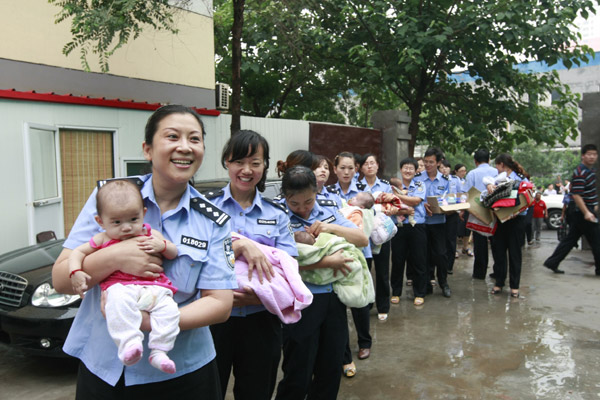Authorities to place stolen babies in care
 0 Comment(s)
0 Comment(s) Print
Print E-mail
China Daily, July 28, 2011
E-mail
China Daily, July 28, 2011
All 89 kidnapped children, including eight Vietnamese infants, who were recently rescued by police from two major human trafficking rings in South China, will not be allowed to stay with the people who bought them.
 |
|
Police take kidnapped children rescued from two human trafficking rings earlier in July to a child welfare institution while the authorities try to locate their birth parents. |
The decision is part of an attempt to limit the growth of the black market in stolen children, said Chen Shiqu, director of the anti-human trafficking office under the criminal investigation bureau of the Ministry of Public Security.
Chen told China Daily the existence of a buyer's market is the main cause of human trafficking crimes.
He said the children should be placed under the temporary care of civil affairs departments before their parents can be located and verified through DNA tests.
"To make the buyers lose both the child and their money, and to completely deny their original intention, we will ask the civil affairs departments to temporarily take care of the rescued children," he said.
Chen said the Vietnamese infants have had health checks and Chinese police were cooperating with Vietnamese authorities to locate their birth parents as soon as possible.
According to the Chinese Criminal Law, if the buyers have not mistreated the children or obstructed the police rescue operation, they will not be held criminally responsible.
Earlier this month, police rescued 89 infants kidnapped for sale and arrested 369 people linked to two human trafficking rings.
In the first case, the traffickers, who were mostly Vietnamese residents, abducted eight children from Vietnam and sold them in Guangdong and Guangxi, said Liu Ancheng, deputy director of the criminal investigation bureau under the ministry.
The gang ringleaders - called "A Zhang" and "A Lan" - lived in Jieyang city, Guangdong, and used mobile phones to direct gang members in Vietnam.
The suspects in Vietnam abducted the infants there, and illegally transported them on bamboo rafts across the Beilun River and over the border, he said.
They then rode bicycles through fields to bypass border checkpoints before arriving at Dongxing and Fangchenggang, in the Guangxi Zhuang autonomous region, from where they took long-distance buses to Nanning, the capital of Guangxi.
From Nanning, they took the children to Shanwei and Jieyang in Guangdong to sell them, with prices ranging from several thousands to tens of thousands of yuan for each child, Liu said.
In the other case, police in 14 provinces and autonomous regions cracked a giant cross-region trafficking group of 330 offenders on July 20, the ministry said.
In this case 81 infants were rescued, aged from 10 days to just 4 months.
The Criminal Law says abducted children whose parents cannot be found will not be available for adoption due to the lack of identification. This means they will live in welfare institutions, which are not conducive to the healthy development of children.
"We are negotiating with civil affairs departments to improve the laws to allow unidentified children to be adopted," Chen Shiqu said.
Li Guifang, vice-director of the criminal defense committee under the All China Lawyers Association, said temporary placement of abducted children in welfare institutions is a heavy blow to the buyer's market, but is not good for the children's well-being.
"Separating them from their adopted family may be a second blow to their young minds," he said.
Ji Gang, director of the domestic adoption department under the Chinese Welfare and Adoption Center, confirmed that the ministry is discussing "conditional adoption" with the civil affairs department.
This would allow adoption of abducted children, whose parents cannot be found, within a specified time, Ji said.





